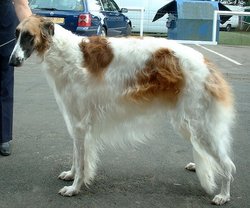
Russian Wolfhound
Russkaya Psovaya Borzaya
|
Dog breeds of the world, Borzol |
| Borzoi | ||
|---|---|---|

A Borzoi
|
||
| Alternative names | ||
| Barzo? Russian Wolfhound Russkaya Psovaya Borzaya |
||
| Country of origin | ||
| Russia | ||
| Common nicknames | ||
| Classification and breed standards | ||
| FCI: | Group 10 Section 1 #193 | |
| AKC: | Hound | |
| ANKC: | Group 4 (Hounds) | |
| CKC: | Group 2 - Hounds | |
| KC (UK): | Hound | |
| NZKC: | Hound | |
| UKC: | Sighthounds and Pariah Dogs | |
| Not recognized by any major kennel club | ||
| This breed of Dog is extinct | ||
| Notes | ||
The Borzoi is a breed of Dog also called the Russian Wolfhound. They have medium-length, slightly curly hair and are similar in shape to Greyhounds. They are a member of the sighthound family.
Borzois can come in almost any color or color combination. Their coat is silky, flat and should never be wooly. This breed is a large variety with males reaching in excess of 100 pounds (45 kg). Males should stand at least 28 inches while females shouldn't be less than 26 inches.
The Borzoi is an intelligent, active Dog. They are gentle with people and have good manners but sometimes are nervous around children. Although it is brutal against wolves, the Borzoi is a brave Dog that will try to dominate many other breeds, but lacks the body weight and the strength to combat a mastiff or similar hefty breed. Even now, young Borzois at play sometimes spontaneously join forces against another Dog, seizing it by the neck and holding it immobile.
The most common health problems are progressive retinal atrophy and gastric torsion. Life expectancy is 10 to 12 years.
Tradition says that they were brought to Russia by Kublai Khan. Although this might be true, the original Borzoi stock was crossed with different Russian herding Dogs, which explains the breed's ability to deal with wolves?this was an important part of a herding Dog's work in the past, when wolves were more common.
Borzois were popular with the Tsars before the 1917 revolution, and for a long time Borzois could not be purchased but only given as gifts from the Tsar. The most famous breeder was the Russian Grand Duke Nikolai Nikolaievich, (son of Nicholas I of Russia), who bred hundreds of Borzois at Perchino, his private kennel. During Tsarist times, several varieties of wolfhounds were bred; however, after the revolution, many of the Tsarist breeds were neglected.
During that time, Russians also performed "hunting tests", to show that Borzois could actually hold a wolf until the hunter arrived. The wolf hunt itself was organized with riding hunters and Foxhounds on the Russian steppe. When the wolf was sighted, the hunter would release a pair of Borzois. The Borzois would charge the wolf, attack its neck from both sides, and hold it until the hunter arrived. The classical killing was by the human hunter with a knife.
A stylized Borzoi serves as the logo for the Knopf Publishing Group, an imprint of Random House publishers. [1]
Dog breeds of the world, Borzol